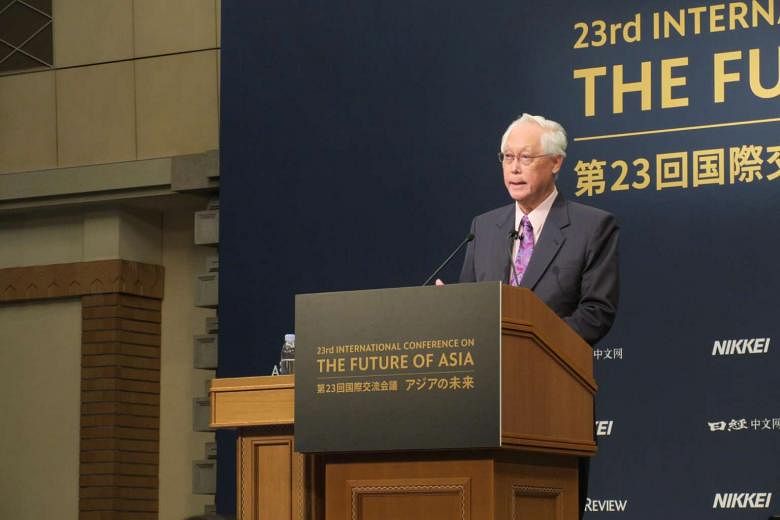TOKYO - It is crucial that Japan and China lead Asia in tandem towards greater integration, Emeritus Senior Minister Goh Chok Tong said on Monday (June 5), urging both countries to set their rivalry and historical mistrust aside.
"It will not work as well if only one country leads the charge. If both countries provide competitive but divergent leadership, it will be destabilising," Mr Goh said in a keynote address at the two-day Nikkei Future Of Asia conference.
"If Japan-China relations can move towards greater trust and cooperation, there will be a mutually-reinforcing effect on the other key bilateral relationships in the region."
This would also form the basis for a strong trilateral relationship with the United States that can act as an important force for stability and continued economic growth and prosperity for Asia and the world, he added.
The theme of this year's conference is Globalism At A Crossroads - Asia's Next Move. It features speakers like Vietnam Prime Minister Nguyen Xuan Phuc, Laos Prime Minister Thongloun Sisoulith, Thai Deputy Prime Minister Somkid Jatusripitak, Indonesia Vice-President Jusuf Kalla and former Malaysian Prime Minister Mahathir Mohamad.
In his speech, Mr Goh noted how the benefits of free trade have been widely seen and felt, yet insufficient attention had been paid to the tail risks of globalisation, including wage stagnation and a loss of jobs.
This was why US President Donald Trump's campaign slogan of putting "America First" had resonated with the masses, Mr Goh said, noting that at the heart of the "Me First" phenomenon "is a hub-and-spokes strategy which enables a big economy to bilaterally exercise its bargaining power over smaller economies".
He added: "It is like a yokozuna, a grand champion sumo wrestler, taking on smaller-sized wrestlers one at a time."
If global leadership goes missing, Mr Goh said, the "Me First" phenomenon could devolve to a "Me Only" one which unravels the global cooperation required to address challenges such as financial crises, money laundering, climate change, public health epidemics and terrorism.
"The outcome is anarchy and failure of the international system as we know it," Mr Goh said. "The last time this happened, we had two world wars."
As such, Mr Goh said, there is a need to build greater interdependence among countries, which will require respect for one another, the rule of law and give-and-take cooperation.
The two high-profile multilateral free trade agreements - the Trans-Pacific Partnership (TPP) and the Regional Comprehensive Economic Partnership (RCEP) - and China's "Belt and Road" initiative to build infrastructure and connectibility, are examples of how Asia can build interdependence, champion free trade and further integration, Mr Goh said.
He added that China and Japan can take the lead as Asia's top two economies.
In Japan's case, Mr Goh noted how Prime Minister Shinzo Abe is leading the country to "assume an increasingly proactive role on the global stage". With the US having withdrawn from the TPP, Japan is stepping up to lead the remaining 11 countries forward.
"In what will prove to be another historic milestone for Japan, PM Abe overcame domestic reluctance to make the bold and visionary decision to join the TPP. He wants Japan to maintain an outward orientation," Mr Goh said, also noting Japan's efforts to boost physical and economic connectivity in South-east Asia and the Indo-Pacific.
Meanwhile, China is a "vocal proponent" of free trade, Mr Goh said, with the country willing to take the lead through the Belt and Road initiative and the Asian Infrastructure Investment Bank with President Xi Jinping having given an "impassioned defence of the liberal international economic order".
Small countries, too, have their part to play, he said, describing them as non-threatening, outward-looking and can "propose creative ideas without raising suspicions of an ulterior motive".
"But they need to advance their interests based on principles and not take sides based on a patron-client relationship," he said. For instance, today's TPP was a result of a P4 agreement involving Brunei, Chile, New Zealand and Singapore.
Meanwhile, as Asean marks its 50th anniversary this year, Mr Goh said, it is intensifying efforts to achieve deeper economic integration via the Asean Economic Community that has reduced barriers to trade and promoted economic growth for the member countries.
"Asia needs to do its utmost to take our prosperity to the next level. With strong leaders working together, we can achieve this," he said.


